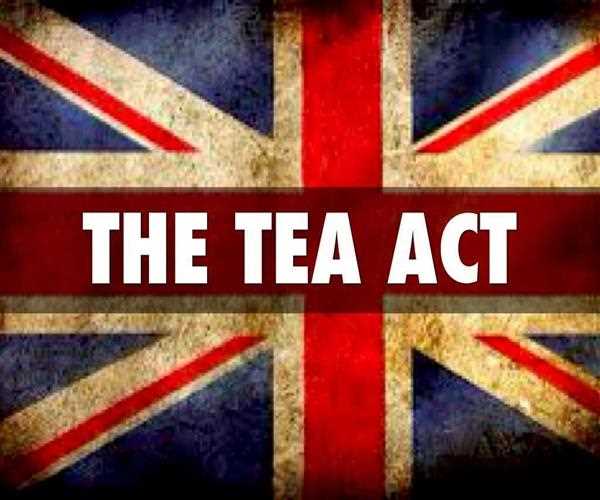The Tea Act, go by Parliament on May 10, 1773, conceded the British East India Company Tea a restraining infrastructure on tea deals in the American states. The Tea Act was the issue that is finally too much to bear in a progression of disliked strategies and charges forced by Britain on her American states.

The strategy touched off a "powder barrel" of restriction and disdain among American homesteaders and was the impetus of the Boston Tea Party. The death of the Tea Act forced no new assessments on the American states. The duty on tea had existed since the death of the 1767 Townshend Revenue Act. Alongside tea, the Townshend Revenue Act additionally burdened glass, lead, oil, paint, and paper. Because of blacklists and challenges, the Townshend Revenue Act's duties were revoked on all products with the exception of tea in 1770.
The tea assess was kept keeping in mind the end goal to keep up Parliament's entitlement to impose the states. The Tea Act was not expected to outrage American pioneers, rather it was intended to be a bailout strategy to get the British East India Company out of obligation. The British East India Company was experiencing gigantic measures of obligations acquired fundamentally from yearly legally binding installments because of the British government totaling £400,000 every year. Furthermore, the British East India Company was enduring fiscally because of precarious political and financial issues in India, and European markets were feeble because of obligations from the French and Indian War in addition to other things.
Other than the duty on tea which had been set up since 1767, what in a general sense rankled the American pioneers about the Tea Act was the British East India Company's legislature endorsed imposing business model on tea.
Before the Tea Act, the British East India Company Tea was required to solely offer its tea at closeout in London. This required the British East India Company to pay an expense for every pound of tea sold which added to the organization's money related weights. The Tea Act prematurely ended this confinement and conceded the British East India Company permit to send out their tea to the American states. This opened up the British East India Company's business sectors to the lucrative American provinces.
The tea was to be delivered to the American settlements and sold at a lessened rate. The Townshend Revenue Act tea charge stayed set up in spite of recommendations to have it deferred. American settlers were offended over the tea charge, which had existed since the 1767 Townshend Revenue Act and did not get revoked like alternate expenses in 1770, and trusted the Tea Act was a strategy to increase frontier bolster for the assessment effectively upheld. The immediate offer of tea by specialists of the British East India Company to the American settlements undercut the matter of pilgrim dealers. Before the Tea Act, frontier vendors obtained tea straightforwardly from British markets or pirated from illicit markets. They at that point transported it back to the provinces for resale. Shocked that American dealers were undermined, settlers at first in Philadelphia and New York rejected the British East India Company tea to be offloaded and sent the boats back to England. In numerous frontier ports to dissent the Tea Act, the shipment of British East India Company tea was emptied and left immaculate on the docks to decay.
The Beaver, Dartmouth, and Eleanor landed in Boston in late November to the center of December 1773. The homesteaders, drove by the Sons of Liberty, needed the boats to come back to England, and declined the emptying of the boats' load of tea. Lieutenant Governor and Chief Justice of Massachusetts, Thomas Hutchinson, declined to give the boats a chance to come back to England and held the Beaver, Dartmouth, and Eleanor in Boston Harbor until the point when matters could be settled and the tea offloaded.
"Cheers"